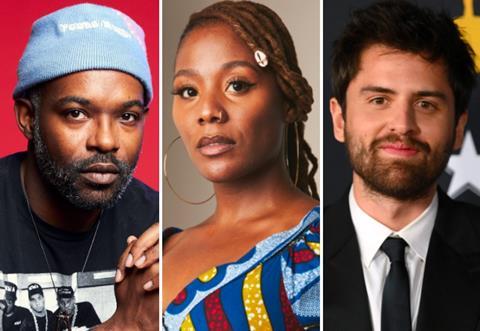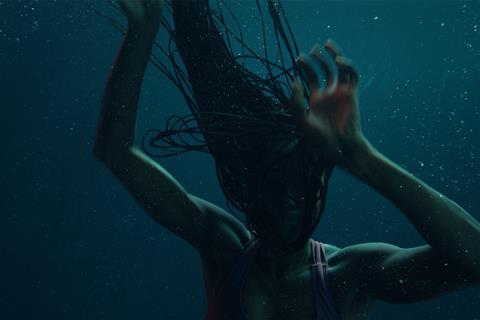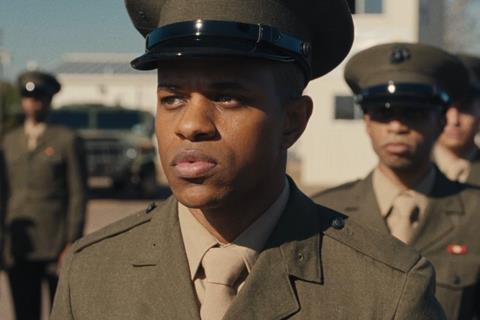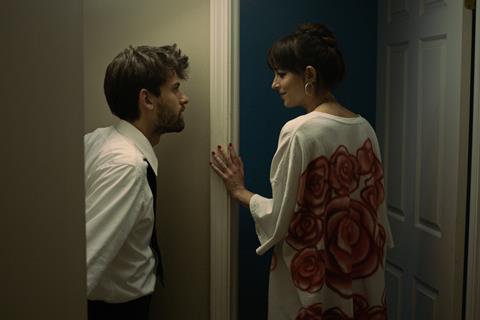
Among the standouts from the 2022 US independent circuit, Nanny, Cha Cha Real Smooth and The Inspection each debuted at prestigious festivals and mark first or second-time features from three of the most exciting prospects working in the US today.
Shorts filmmaker Nikyatu Jusu’s feature debut Nanny premiered at the virtual 2022 Sundance Film Festival and won the US dramatic competition grand jury prize. It follows Aisha (Anna Diop), an undocumented Senegalese nanny working in New York who dreams of bringing her young son to the US and finds her American Dream is assailed by supernatural forces. Blumhouse and Prime Video acquired worldwide rights and Amazon Studios released Nanny theatrically on November 23 ahead of its Prime Video debut on December 16. Jusu is nominated in the Independent Spirit Awards’ Someone To Watch category. Nanny is produced by Stay Gold Features, Topic Studios, LinLay Productions and Blumhouse Television.
Cooper Raiff’s Cha Cha Real Smooth also premiered in the US dramatic competition at Sundance 2022 where it won the audience award and stole the headlines when Apple paid $15m for worldwide rights just days after the premiere. The follow-up to Raiff’s debut and 2020 virtual SXSW grand jury award winner Shithouse, Cha Cha Real Smooth follows a graduate and New Jersey bar/bat mitzvah party-starter who befriends a young mother and her autistic daughter. Raiff, Dakota Johnson and Vanessa Burghardt star. The film launched day‑and‑date on June 17 in select cinemas and on Apple TV+. Picturestart and Endeavor Content (now Fifth Season) co-financed the feature and produced with Johnson and Ro Donnelly’s TeaTime Pictures.
TV and shorts director Elegance Bratton’s feature debut The Inspection premiered at Toronto International Film Festival in September. Loosely based on the New Jersey-born filmmaker’s life, it centres on a homeless gay Black man under the shadow of his homophobic mother who turns his life around when he joins the Marines. The film stars Jeremy Pope, Gabrielle Union and Raul Castillo. Pope and Union are in contention for Independent Spirit acting awards while Bratton and fellow producers Effie Brown and Chester Algernal Gordon are nominated for best first feature. Pope is nominated for best actor in a drama film at the Golden Globes. The Inspection is produced by Gamechanger Films and Bratton and Gordon’s Freedom Principle, and went on limited release through A24 on November 18.
Jusu, Raiff and Bratton sat down with Screen International for a Zoom conversation in early December.
Screen International: How did your projects come about?

Nikyatu Jusu: It took eight-ish years from concept to financing to completion. The big challenge was getting a draft that was financeable — and that’s subjective depending on what you have under your belt or who your characters are. The more marginalised you are, the closer to completion the draft needs to be. This wasn’t my first feature concept but it was the first one that got financing. The catalyst, outside of doing the Sundance labs, was finding my producing partner Nikkia Moulterie who could make the words on the page tangible in budget form. I did the [2020] Sundance Institute directors and screenwriters lab and Nikkia did the [2019] Sundance Institute creative producing labs and summit where she met Stay Gold, whose Daniela Taplin Lundberg took interest and was first in. Then we did Catalyst, a financing incubator with Sundance, and got our last money in. In the interim, Daniela brought on Topic.
Cooper Raiff: I had just made my first movie and was trying to make a show. I had a general [meeting] with Ro Donnelly, Dakota Johnson’s producing partner at TeaTime Pictures. She was interested and I had a Zoom with her and Dakota. I wrote Cha Cha really quickly and developed it with them over three or four months. When we finally went out with the script, we met with financiers whom Ro knew and ended up going with Picturestart and Endeavor.
Elegance Bratton: I wrote the first draft in 2017, right around when I sold my first TV show [documentary/reality series] My House to Viceland. I wrote three scripts and went to my producing partner Chester Algernal Gordon and he said I should make the most personal one. So I did another take on The Inspection and took it to my buddy at A24, who didn’t want it yet. I applied to all the labs and got rejected and went to Hollywood with mixed reactions. I swore off all the labs. Chester applied to the [2019] Tribeca All Access [programme] behind my back and we got in. I pitched the movie and changed the logline, which changed the script. In the end [after a couple more labs] I got 12 offers, sent my buddy at A24 texts of Harry Potter on the train going to Hogwarts, telling him he could jump on the train if he wanted to. He jumped on. After we did the [2019 Film Independent] Fast Track [programme], Effie Brown [the Gamechanger Films CEO to whom Bratton and Gordon had pitched the project in 2018] called us into the office.
Raiff: Elegance, how did the logline change?
Bratton: Initially a mentor told me to get rid of the words “Black” and “gay” because he felt it was not universal enough, presumably to a white straight male executive because that was [the norm] five, six years ago. At one point I had Black, gay, homeless. The movie’s not really a romance but there are definitely some forms of desire and eroticism to it, but love stories are more popular than frustrated unrequited love stories… so I ended up switching the logline to emphasise the relationship he has with the drill instructor who is his support system. When I was rewriting the script, it lacked action and I recommitted to the story coming from [lead character] French’s point of view as a Black, gay character based on myself. I’ve been calling it, “Black gay Rocky”.
Raiff: When I was pitching Cha Cha, I said Wedding Crashers a lot. It’s nothing like Wedding Crashers but I would say, “You’ve seen Wedding Crashers, right?” and people would say, “Yeah, made a lot of money.”

Why did you want to tell these particular stories?
Bratton: When I joined the Marines, I did so after 10 years spent homeless. By the time I arrived to boot camp I felt completely worthless. A drill instructor reminded me that my life was valuable because I had a responsibility to protect the person to my left and right. I had never been trusted like that before. The concept gave me something to hold onto that helped me get to where I am now in life. I made this film to start a conversation between left and right. I also wanted to make something that honours the radical defiant empathy I think we need to get through these polarised times we live in.
Raiff: I wanted to tell a story about the unique relationship between a mom who is going to be entangled in her daughter’s life more than the usual mom, for the rest of her life. A mother whose stages will always be defined by her kid’s. Then it ultimately became a story about two people helping each other get strong for two different stages in their lives.
Each of you wanted authentic casting. Jeremy Pope is an out gay Black man. Anna Diop has West African heritage. Vanessa Burghardt is on the autism spectrum. Why was that important to you?
Raiff: When I cast every role, I’m trying to make it the best possible, most realistic, grounded, emotional thing. When we did the casting call, we were only seeing autistic actresses.
Jusu: I didn’t write Aisha as a Senegalese woman. I knew I had to write her broadly as West African. I’m first-generation American born to Sierra Leonean parents and I had to at least identify a region and intentionally left room for an actress to breathe life into this in a specific way. It’s no coincidence Anna had [HBO Max superhero series] Titans as a — quote unquote — mainstream testament to her work. I knew Anna was the one, but I had to convince financiers and that often means showing a piece of work in the resumé that is mainstream.
Bratton: The lack of representation on screen correlates with how people are treated in real life. Navigating invisibility has been the story of my life. It is the thing that drove me to cinema and it’s also the thing that makes me a storyteller, for that opportunity for people to bear witness to me existing, because if it doesn’t happen then I’m completely washed out.
Jeremy’s a phenomenally talented artist regardless of who he wants to be with or the colour of his skin. This is an art form that was started 120 years ago by people who had at times, and I hate to say it, white supremacist intentions. So I do think that this being an industry of precedent, now you can understand what it’s like for us to push our authenticity in a business that was never really designed to validate our humanity, [and in fact was designed] to sublimate us and make that okay.
How did production go?

Raiff: There were a lot of hiccups. We wore masks. We didn’t get shut down. We were in Pittsburgh and there weren’t a lot of clubs where people might catch Covid and no-one was sneaking out of the hotel. When we got to Pittsburgh, we spent six weeks prepping and the movie almost got shut down 100,000 times because of money and [people] trying to make it smaller. With indie filmmaking that’s the thing that happens all the time. It’s all about the risk and squeezing every single cent out of something.
Bratton: We shot our movie in 19 days. We were promised 23 but then we had a Covid shutdown. We [started shooting] it in the summer in Mississippi, which I will never do again. Then we came back after a four-month break. I had a pretty positive experience with A24 and always felt supported.
Jusu: We shot at the peak of Covid all over New York City last summer. We didn’t get a positive case in zone A, which is what shuts down your production, until the second-to-last day of a 27-day shoot. The producers had to convince the crew to stay on set… There were studio productions around me going down from Covid but they were able to go back up. I knew that if we went down, we weren’t going to come back up.
Where do you stand on the theatrical/streaming spectrum?
Bratton: I’m older so I like going to the movies. At the same time, I come from the ’hood and before there was Netflix there was a barbershop, and every movie was for sale [there]. I’m all about a nice long life-cycle for my work. The elitist in me loves the theatre — it’s like church in a way.
Jusu: We had our theatrical release right before Thanksgiving and limited theatrical globally for some African nations. We made this film for the big screen… everything was so painstakingly intentional in terms of soundscape and visual landscape. But the reality is that most of the people who will be touched by this film will be accessing it through streaming and so having a hybrid rollout through Blumhouse and Amazon just feels really luxurious right now.
Raiff: It would be funny if I said I’m younger so I love streaming. I fell in love with movies going to a theatre so I want everything to be theatre-only. I watched The Inspection trailer during a screening of Aftersun. It’s just a different experience seeing something in a dark room on a big screen. I’m so grateful to Apple that people can see Cha Cha so there’s no complaining, but theatres are where it’s at.
What did festival exposure do for your films?
Bratton: I liked playing Toronto — they had a red carpet, I wore some cute clothes. I came up through the festival circuit [with short films] and it opened so many doors for me playing queer and Black film festivals. I’m grateful that I got into the bigger festivals this time around, but that work I put in for years on the regional level helped my career.
Raiff: Sundance was on our phones, but I love festivals for their love of movies. I’ve had great experiences at SXSW. These festivals really care about movies and that’s what is so special about them.

























No comments yet